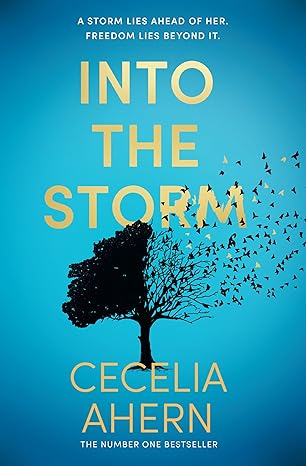Into the Storm – Cecelia Ahern

On a storm-ravaged December night, Dr. Enya Pickering makes a split-second decision that will shatter her carefully constructed life. Stopping to help a teenage hit-and-run victim, she has no idea that this single act of compassion will awaken buried trauma, unravel her sense of reality, and send her spiralling into the depths of grief and paranoia. As she retreats into the wilds of rural Ireland, where ancient folklore and long-buried secrets lurk in the shadows, Enya must confront the ghosts of her past before they consume her completely.
At first glance, Enya appears to have everything—a thriving career, a loving family, and the security of a privileged life in a grand Irish estate. But beneath the surface, fractures are already forming. The fateful night of the accident is not the cause of her unravelling but the catalyst, pulling her deeper into the unprocessed grief and anxiety she has spent years trying to suppress. Desperate for solace, she withdraws into the countryside, but instead of peace, she finds herself entangled in eerie folklore and unsettling memories that refuse to stay buried.
From the very first pages, there’s a sense that something isn’t quite right with Enya. As the novel unfolds, her mental health deteriorates under the crushing weight of grief, anxiety, and long-buried trauma—exacerbated by the sobering realisation that she has now outlived her mother. Ahern captures this struggle with raw honesty, immersing the reader in Enya’s growing paranoia and self-doubt. At times, her inner turmoil is so vividly portrayed that it’s hard not to feel consumed by it. However, this also makes her a tough character to connect with—her isolation and self-absorption may feel alienating to some readers, yet painfully familiar to anyone who has ever grappled with deep emotional wounds.
The novel’s pacing falters as Enya’s downward spiral takes centre stage. Ahern introduces historical articles from a long-deceased character, which initially seem promising but often feel like a distraction rather than an enhancement. Side plots pop up here and there, hinting at intrigue but ultimately adding to the novel’s disjointed feel. Whether intentional or not, this patchwork approach creates a lingering unease—sometimes effective, sometimes frustrating.
That said, Into the Storm isn’t without its strengths. The supporting cast is well-drawn, adding depth where Enya struggles to provide it. But the real standout element is the infusion of Irish mythology. Ahern doesn’t just sprinkle in folklore for atmosphere—she weaves it directly into the heart of the story, using it as a mirror for Enya’s own journey through loss and identity. Many of these myths sound far-fetched, so of course, I had to check whether they were part of the fiction woven by the author, but to my genuine surprise, they were not. All of the myths appear to be rooted in actual Irish legends, something that is a massive boon to a reader who loves mythology, adding richness and authenticity that keeps the novel from feeling completely bleak.
Ahern’s writing is undeniably beautiful. The storm isn’t just a setting—it’s practically a character itself, raging alongside Enya’s inner turmoil. Her descriptions of rural Ireland are haunting and atmospheric, filled with rugged landscapes and whispers of something ancient. However, the weight of these lush descriptions sometimes slows the pace even more, making the novel feel heavier than it needs to be.
And then there’s the ending. After all the emotional investment, the resolution feels… underwhelming. Not terrible, just not as satisfying as you might hope. It’s like finishing a marathon only to be handed a lollipop—technically, you got what you were promised, but it’s not quite the reward you expected.
It’s also worth noting that the novel tackles some heavy themes—hit-and-run accidents, drunk driving, adultery, and medical malpractice. Ahern handles them with care, but they contribute to the book’s overall emotional weight. If you’re in the right headspace, this depth can be compelling; if you’re not, it might feel overwhelming.
So, would I recommend Into the Storm? That depends. If you’re drawn to slow-burning, introspective novels that lean into psychological drama and mythology, this could be a fascinating read. But if you prefer tightly woven plots with a strong sense of resolution, you might find it frustrating. Ahern’s talent is clear—she knows how to create atmosphere and emotion—but this novel doesn’t quite hit the mark in delivering a truly satisfying narrative arc.
Buy it here and help support the site at no cost to you!
